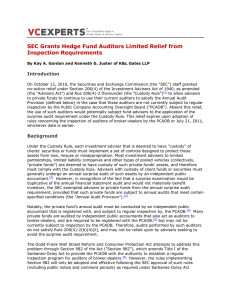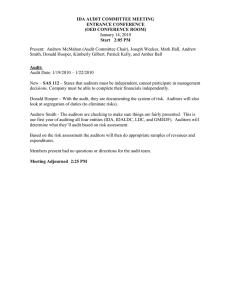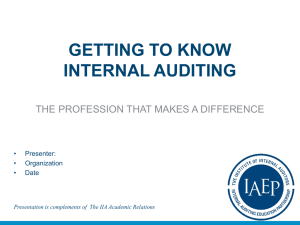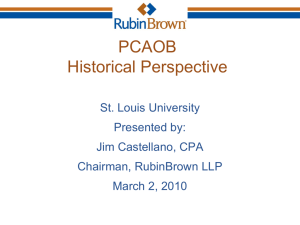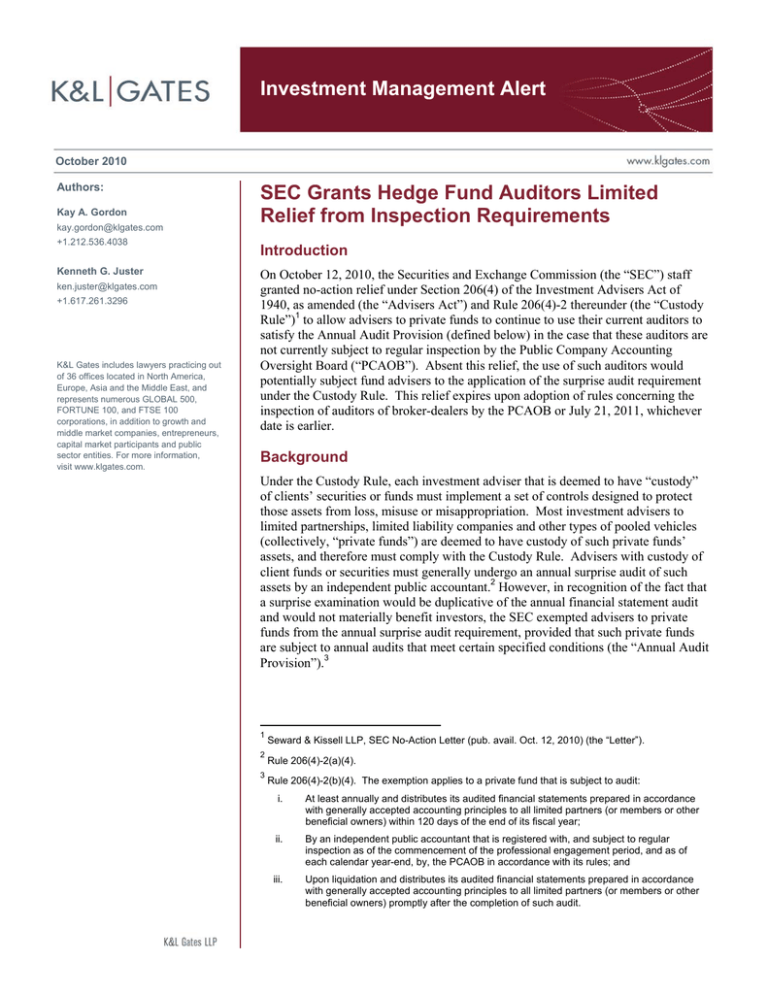
Investment Management Alert
October 2010
Authors:
Kay A. Gordon
kay.gordon@klgates.com
+1.212.536.4038
Kenneth G. Juster
ken.juster@klgates.com
+1.617.261.3296
K&L Gates includes lawyers practicing out
of 36 offices located in North America,
Europe, Asia and the Middle East, and
represents numerous GLOBAL 500,
FORTUNE 100, and FTSE 100
corporations, in addition to growth and
middle market companies, entrepreneurs,
capital market participants and public
sector entities. For more information,
visit www.klgates.com.
SEC Grants Hedge Fund Auditors Limited
Relief from Inspection Requirements
Introduction
On October 12, 2010, the Securities and Exchange Commission (the “SEC”) staff
granted no-action relief under Section 206(4) of the Investment Advisers Act of
1940, as amended (the “Advisers Act”) and Rule 206(4)-2 thereunder (the “Custody
Rule”)1 to allow advisers to private funds to continue to use their current auditors to
satisfy the Annual Audit Provision (defined below) in the case that these auditors are
not currently subject to regular inspection by the Public Company Accounting
Oversight Board (“PCAOB”). Absent this relief, the use of such auditors would
potentially subject fund advisers to the application of the surprise audit requirement
under the Custody Rule. This relief expires upon adoption of rules concerning the
inspection of auditors of broker-dealers by the PCAOB or July 21, 2011, whichever
date is earlier.
Background
Under the Custody Rule, each investment adviser that is deemed to have “custody”
of clients’ securities or funds must implement a set of controls designed to protect
those assets from loss, misuse or misappropriation. Most investment advisers to
limited partnerships, limited liability companies and other types of pooled vehicles
(collectively, “private funds”) are deemed to have custody of such private funds’
assets, and therefore must comply with the Custody Rule. Advisers with custody of
client funds or securities must generally undergo an annual surprise audit of such
assets by an independent public accountant.2 However, in recognition of the fact that
a surprise examination would be duplicative of the annual financial statement audit
and would not materially benefit investors, the SEC exempted advisers to private
funds from the annual surprise audit requirement, provided that such private funds
are subject to annual audits that meet certain specified conditions (the “Annual Audit
Provision”).3
1
2
3
Seward & Kissell LLP, SEC No-Action Letter (pub. avail. Oct. 12, 2010) (the “Letter”).
Rule 206(4)-2(a)(4).
Rule 206(4)-2(b)(4). The exemption applies to a private fund that is subject to audit:
i.
At least annually and distributes its audited financial statements prepared in accordance
with generally accepted accounting principles to all limited partners (or members or other
beneficial owners) within 120 days of the end of its fiscal year;
ii.
By an independent public accountant that is registered with, and subject to regular
inspection as of the commencement of the professional engagement period, and as of
each calendar year-end, by, the PCAOB in accordance with its rules; and
iii.
Upon liquidation and distributes its audited financial statements prepared in accordance
with generally accepted accounting principles to all limited partners (or members or other
beneficial owners) promptly after the completion of such audit.
Investment Management Alert
Notably, the private fund’s annual audit must be
conducted by an independent public accountant that
is registered with, and subject to regular inspection
by, the PCAOB.4 Many private funds are audited by
independent public accountants that also act as
auditors to broker-dealers, and are required to be
registered with the PCAOB,5 but may not be
currently subject to inspection by the PCAOB.
Therefore, audits performed by such auditors do not
satisfy Rule 206(4)-2(b)(4)(ii), and may not be relied
upon by advisers seeking to avoid the surprise audit
requirement.
The Dodd-Frank Wall Street Reform and Consumer
Protection Act attempts to address this problem
through Section 982 of the Act (“Section 982”),
which amends Title I of the Sarbanes-Oxley Act to
provide the PCAOB with the authority to establish a
regular inspection program for auditors of brokerdealers.6 However, the rules implementing Section
982 will only be adopted and effective following the
SEC approval of such rules (including public notice
and comment periods) as required under SarbanesOxley Act Section 107(b). Accordingly, to comply
with the Annual Audit Provision, advisers to private
funds would be required to replace their current
auditors unless and until such auditors become
subject to PCAOB inspections even if such auditors
are registered with the PCAOB.
•
the auditor was engaged to audit the financial
statements of one or more of the private funds
for the most recently completed fiscal year;
•
the auditor was registered with the PCAOB and
engaged to audit the financial statements of a
broker or dealer on July 21, 2010 and is
registered with the PCAOB and engaged to
audit the financial statements of a broker or
dealer as of the issuance of audited financial
statements used to satisfy the Annual Audit
Provision; and
•
the adviser provides written notification to each
investor in each private fund prior to the
distribution of the financial statements that the
private fund’s auditor is not subject to regular
inspection by the PCAOB.7
This relief is granted only with respect to financial
statements issued prior to the adoption of rules
concerning the inspection of auditors of brokerdealers by the PCAOB or July 21, 2011, whichever
date is earlier. The relief is expected to serve as a
useful interim measure to ensure continuity of
private funds’ relationships with their auditors
where such continuity would have been otherwise
unnecessarily interrupted because of the timing of
the rulemaking agenda.
No-Action Relief
In recognition of the disruption to the adviser and
additional cost to investors that would result from
requiring advisers to private funds to change
auditors, the SEC staff has granted no-action relief
under Section 206(4) of the Advisers Act and Rule
206(4)-2 thereunder to permit such advisers to
continue to use their current auditors to satisfy the
Annual Audit Provision, subject to the following
conditions:
4
Rule 206(4)-2(b)(4)(ii).
5
Following the passage of the Sarbanes-Oxley Act of 2002
(the “Sarbanes-Oxley Act”), Section 17(e) of the Securities
Exchange Act of 1934 provides that every registered broker or
dealer shall annually file with the SEC certain financial
statements that are certified by a firm that is registered with the
PCAOB.
6
See Dodd-Frank Wall Street Reform and Consumer
Protection Act, Section 982.
7
See the Letter.
October 2010
2
Investment Management Alert
Anchorage Austin Beijing Berlin Boston Charlotte Chicago Dallas Dubai Fort Worth Frankfurt Harrisburg Hong Kong London
Los Angeles Miami Moscow Newark New York Orange County Palo Alto Paris Pittsburgh Portland Raleigh Research Triangle Park
San Diego San Francisco Seattle Shanghai Singapore Spokane/Coeur d’Alene Taipei Tokyo Warsaw
Washington, D.C.
K&L Gates includes lawyers practicing out of 36 offices located in North America, Europe, Asia and the Middle East, and represents numerous
GLOBAL 500, FORTUNE 100, and FTSE 100 corporations, in addition to growth and middle market companies, entrepreneurs, capital market
participants and public sector entities. For more information, visit www.klgates.com.
K&L Gates comprises multiple affiliated entities: a limited liability partnership with the full name K&L Gates LLP qualified in Delaware and
maintaining offices throughout the United States, in Berlin and Frankfurt, Germany, in Beijing (K&L Gates LLP Beijing Representative Office), in
Dubai, U.A.E., in Shanghai (K&L Gates LLP Shanghai Representative Office), in Tokyo, and in Singapore; a limited liability partnership (also named
K&L Gates LLP) incorporated in England and maintaining offices in London and Paris; a Taiwan general partnership (K&L Gates) maintaining an
office in Taipei; a Hong Kong general partnership (K&L Gates, Solicitors) maintaining an office in Hong Kong; a Polish limited partnership (K&L
Gates Jamka sp.k.) maintaining an office in Warsaw; and a Delaware limited liability company (K&L Gates Holdings, LLC) maintaining an office in
Moscow. K&L Gates maintains appropriate registrations in the jurisdictions in which its offices are located. A list of the partners or members in each
entity is available for inspection at any K&L Gates office.
This publication is for informational purposes and does not contain or convey legal advice. The information herein should not be used or relied upon
in regard to any particular facts or circumstances without first consulting a lawyer.
©2010 K&L Gates LLP. All Rights Reserved.
October 2010
3



